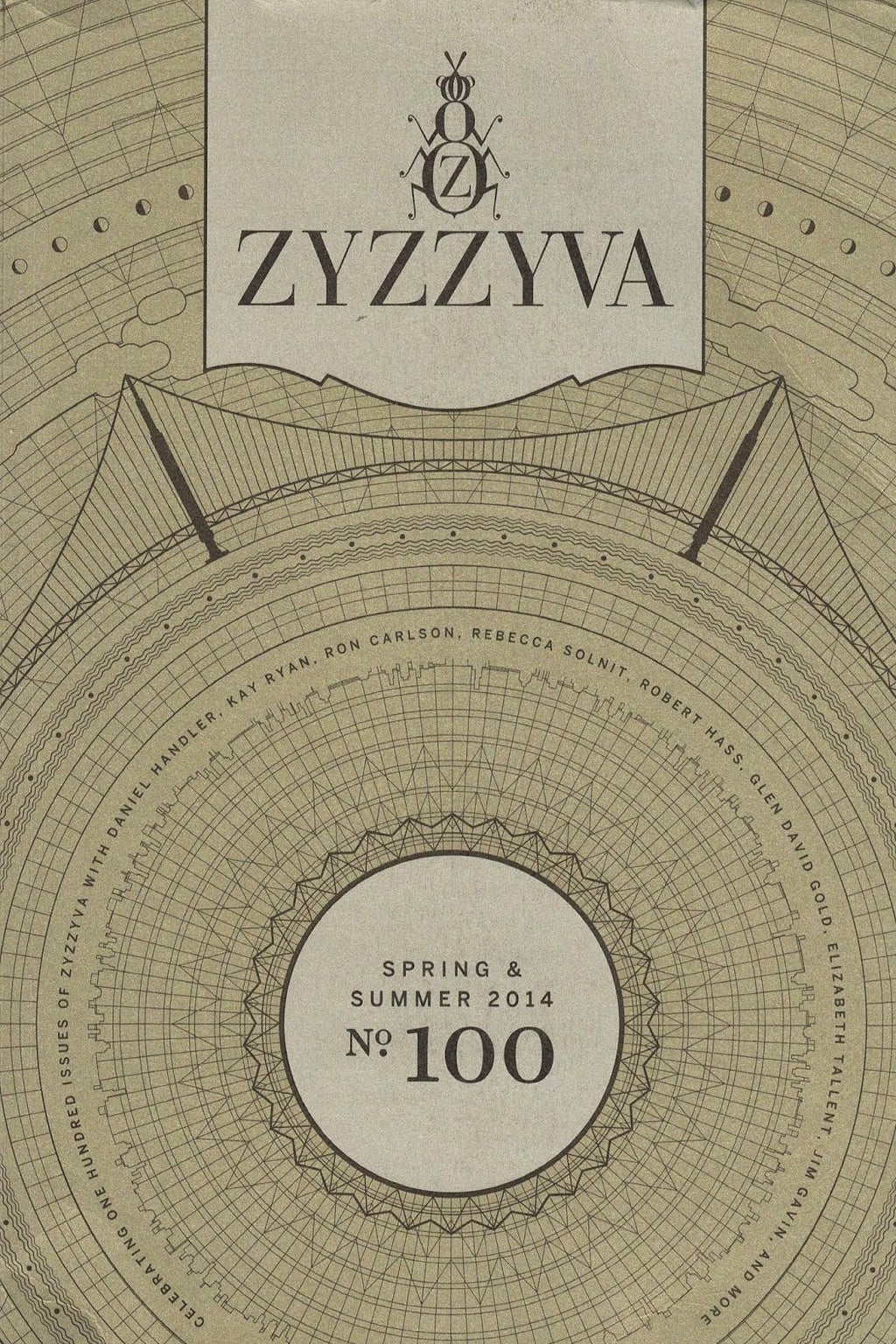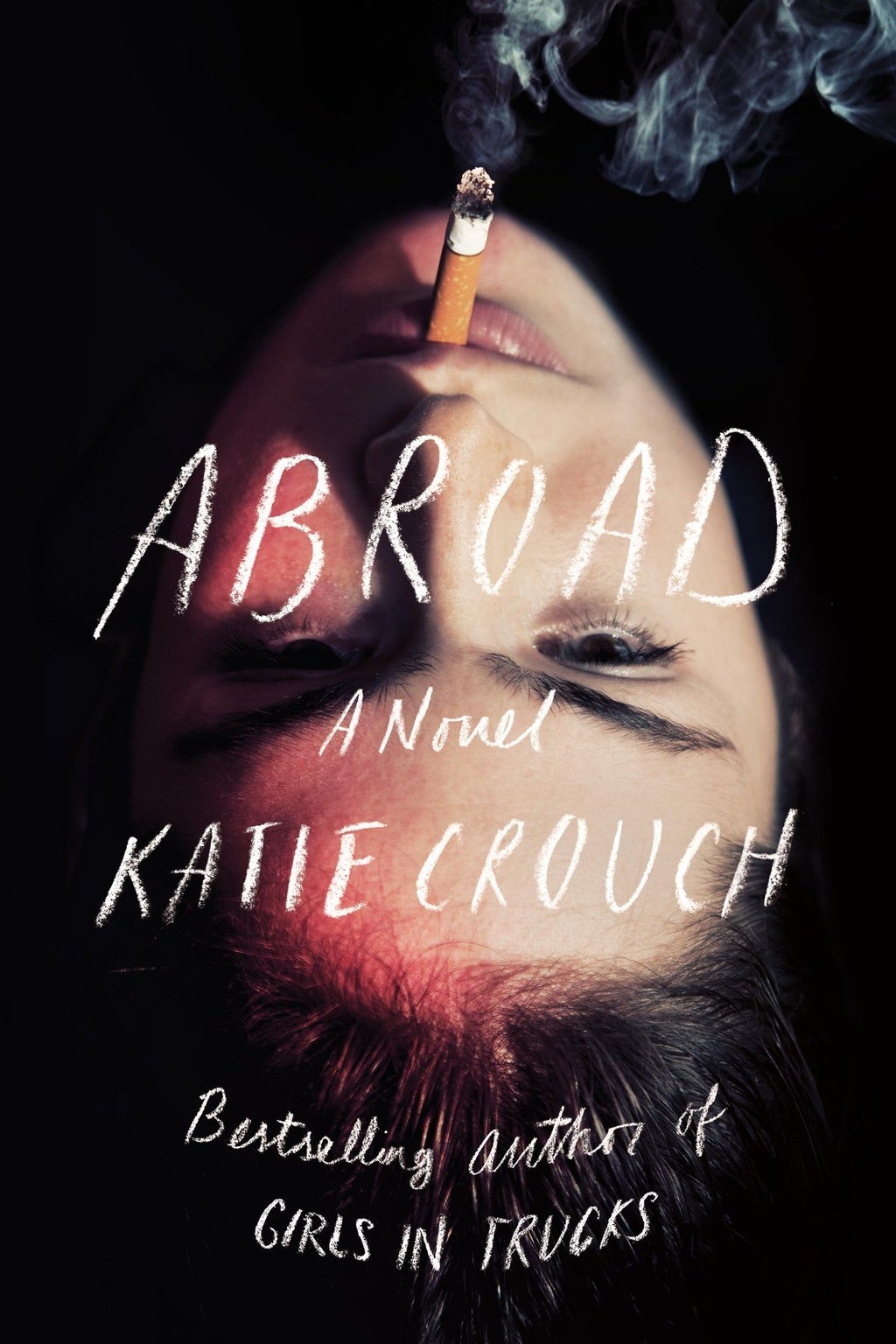Editor's Note: A slightly different version of this essay by author Katie Crouch was originally published in ZYZZYVA's 100th issue, which is very good (and now on newsstands).
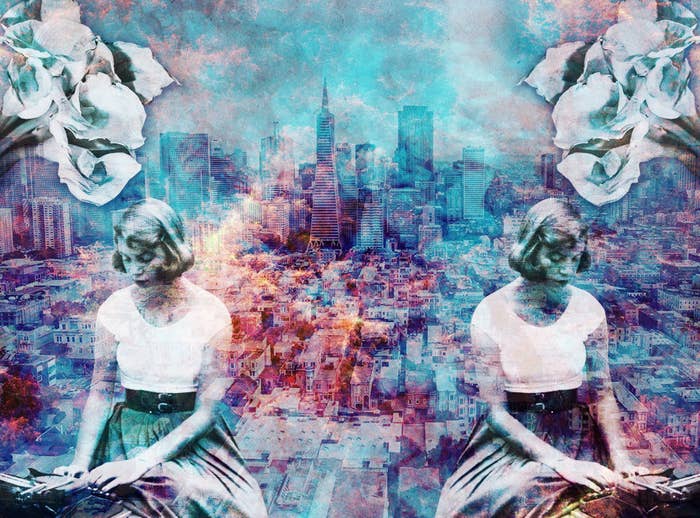
I'm thinking about suicide. Not my own—not that. I'm screwed up, sure. I know about the yawning vortex. Talk to me at three a.m. when I'm groping through the house, chased awake. I can see The Great Nothing in the blinking lights on the television; can hear it in the yowls of the coyotes in the neighbors' fields. I can actually feel certain death, cold as the bathroom mirror while nearby, my family breathes on.
I've had the morning terrors since twenty-nine—a condition diagnosed by various doctors. It goes on whether I drink or don't, whether I give up coffee or poach myself in caffeine, whether I get pricked with acupuncture needles or take medication. They all call it something different. Acute anxiety. Panic attacks. Here' s the deal: I can't fucking sleep.
Yet I'm the sort that comes back in the morning. If I can swing my legs to the floor, then: Eggs. I'm talking about routine here. Death of friend, death of hope, death, period. Still when the day comes, this reason. Eggs.
What I've been thinking about is other people's suicides. What it would be like in those final moments. How brave you'd have to be to pull the trigger or jump off the bridge. And what is the thinking? What final, delicate poems were running through Anne Sexton's mind as she closed the garage door? What spectacular ramblings were spinning through Virginia Woolf as she waded out with that stone?
Sometimes I picture getting there just in time. We know about dreams, don't we? We're allowed to do everything right. I picture rowing to Virginia before her head goes under, or going 'round for a drink at Anne's just as she's getting into the car. Hey, what are you —? Don't do that. Let's go watch movie or something. Or better, some eggs.
Sylvia Plath. 1932–1962. Poet genius who died with her head in the oven. She's one I think about the most, really. After all, I, along with thousands of other bookish females with a tendency towards blue, have worshipped her every word since finding The Bell Jar in the school library at fifteen. Of course, TBJ's only the starter drug. Every serious Plathy knows that. We go on to Ariel (the non-Ted version, of course), then muddle through The Colossus, then, if we're really serious, study the unabridged diaries.
Sylvia! we cry. Oh, there have been armies of us, knobby-elbowed girls poring over her tangled prose while aching away on our twin beds.
We are so alike!
I, too, have gone mad over a boy.
No, thirty boys!!!!
I, too, worship those who pay me no mind!
"Tonight," Sylvia Plath wrote in her diary in 1956, after drinking in the same bar as Auden, "the unforgettable snatching of toothpicks and olive pits from the tables of ambrosia Gods!"
Me too, Sylvia! I totally would have done that!
But she betrayed us. Or you betrayed us. Because can I talk to you, Sylvia? Really talk to you? Why not, right? What are you going to say, no?
You tore up the sequel to The Bell Jar, burned it in a rage. You destroyed another perfectly good book of stories about life at Cambridge, a book I would have loved. And then, you deprived us of a life of prose. You died, Sylvia. On purpose.
Or did you? You, friend, aware of your despair, had hired a nurse the day before to help with the children. A professional, nurturing woman who was due to come the next morning. There are theories that perhaps you wanted to be saved, as you asked the neighbor to check on you hours before the deed and left a note saying to call your doctor. What if that nurse had come early? Even an hour might have made a difference, some sources say. So during my "blue hours," as you called them, I picture showing up to Fitzroy Street. Kicking that door open, slamming open the windows. Wake up, Sylvia. Come on. Breathe. An intervention, during a grey morning eleven years before I was born.

There's something I'm not telling you, Sylvia. Well, there are lots of things, but I don't want to over-share. Do you know that the critics, the ones who rejected and sneered at you, praise you now as a pioneer of female sharing? Accidental or not, you became the colossus. First it was your story, then your voice, then your role in literature. You're an entire genre. The first female confessor.
Though honestly, that title that might not be so terrific. You're not around to see this, but these days we've got females over-confessing all over the place. But the theory is you did it first. Taught us how to share without being disgusting. I hope I'm not disgusting. I'm just talking to you.
All right, so. Sylvia. This really started when I was twenty-six. The same age you were when you married Ted. I had just moved to San Francisco. I often wonder what would have happened if you had come here. If instead of getting all academic and Fulbright about it, you'd just gone Kerouac and hit the road. You'd probably be alive and not famous. Maybe you'd live on my street, still alive and writing in the remote Northern California town I've chased myself into.
But that's not what happened to you. That's what happened to me. San Francisco. I had no reason except this thing called the internet boom. The whole country seemed to tip west. I put a plane ticket on my credit card. I wasn't certain what I was going to do, as I had no skills and nothing to offer but an expensive college degree. I know Smith got you places, New York and Cambridge and all that. But it's come to mean less, college. The smartest ones don't even go now. They start companies at nineteen and become billionaires and buy fancy bowling alleys. I don't want to generalize, but unless you come in the form of a Sylvia Plath app, these tech kids probably don't care about much you.
But back then. 1999! We were somewhere in the middle of David Foster Wallace and the new Star Wars. I was scared, Sylvia. I had a window seat, and as we were landing I pressed my forehead against the glass. The city was iced with pink and blue, but mostly, it was the color of the communion wafers the reverend back home used to place on my tongue.
No one writes like you about being a lost girl in the city, Sylvia. Those scenes in The Bell Jar, where you were lonely and sick in Manhattan and not sure what to wear or how to act, those are never to be surpassed. So I'll just give you the broad strokes. Temping at a pet food company. Drinking all night, falling asleep on a camping mattress in a friend's closet. Awake at seven, rising with the energy of a Dionysian nymph. I didn't know it then, but those nights of sleep, they were true miracles.
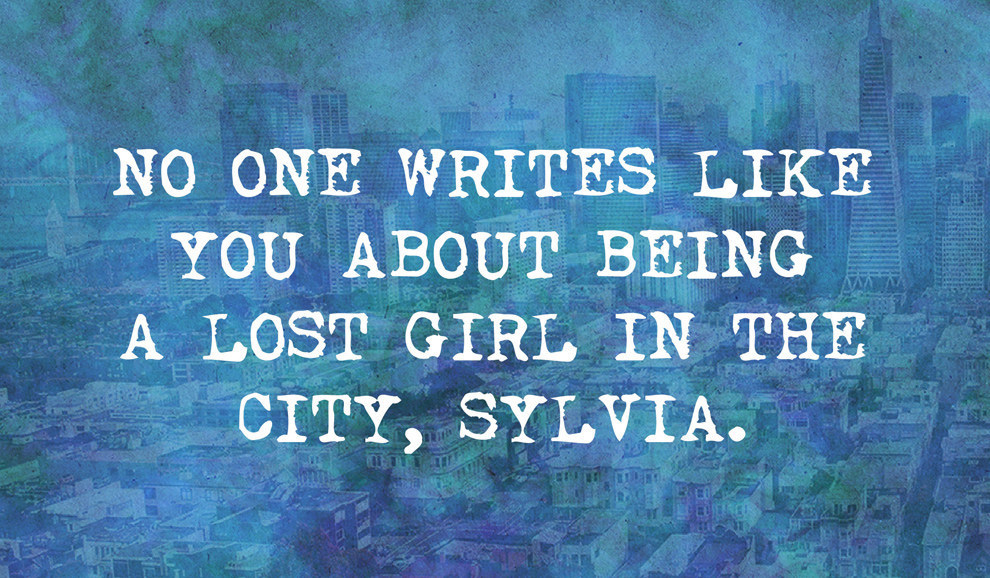
I got a job. Actually, I had three jobs in one year, one more lucrative then the next. 1999. It would make you dizzy, how much money there was. These places we worked, they were palaces of waste. Mountains of bagels in the morning, espresso machines, video arcades, ergonomic foot warmers. The place I finally landed, an advertising agency, welcomed me to their "family." I had no experience in advertising, but this didn't matter. They liked my vibe, and paid me $65,000 a year to write about a supply chain. I still don't know what that is.
Sylvia, you only lived to be thirty. But, getting older is actually not so awful. One of the good things, for instance, is the growing ability to make sense of the past. What I see now at forty is just how easy it was, with no purpose other than feeling good and making money, to become unequivocally lost. My job was particularly abstract, as we were not even the company creating nothing, but the company talking about nothing. The agency asked very little of me in actual work, though my soul, it claimed. Every Monday we were to share our "hopes for ourselves" in a "supportive environment." Hugs were encouraged. There was almost always crying involved. I was twenty-six and I took a bath in the Kool-Aid, Sylvia. At the time I had nothing else better in which to believe.
I met many people in 1999. These were not the heady, fascinating poets you surrounded yourself with in your twenties. These were easy men and women, East Coast transplants. Do I want a beer, they'd muse, or a cocktail? We did not see San Francisco as real life. There was always a party, a new way of mingling with the same people, be it an event with a theme of a decade we had missed, or a dinner party with different courses at different people's houses, or a trip to a warehouse pulsing with trance. In your time some of the parties might have been called Happenings, but they were not even as cerebral as that. I remember emerging occasionally and getting cynical about the emptiness of it. Still, I was young, and confident this would eventually change.
It did. But not in the manner that I thought it would. I made a friend, Sylvia. A real friend. And if time is a sieve, he is one pebble from that era still left to me, other than some photos and a pair of white boots I have always, even now, been too scared to wear.
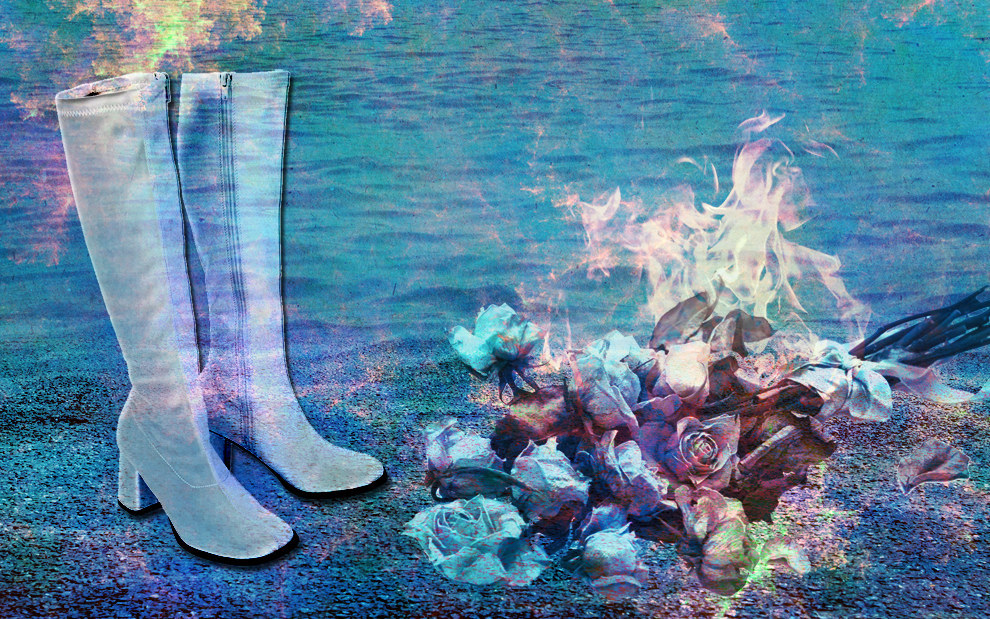
Henry was small and youthful. Almost freakish looking. He appeared one day at the agency, with some other employees that had been acquired from a company my boss had bought. He was five feet, if that. Small but muscled. Shellacked-looking Superman hair. I once heard him described him as a shrink-wrapped superhero. He stood there hovering in our "pod"—the agency's word for shared desk—and looked over at me.
"Hi," he said. "I'm to toil next to you."
This might not sound that funny, but actually, it was hilarious. Since then, I've had some knocks. I've hauled thirty-pound trays of steaming dumplings up grand New York staircases while tuxedoed men grabbed my ass; I've scrubbed customer vomit from toilets. I have toiled, but this place we were working, this was not that. This was passing the day with various provided toys until someone idly asked you to write for ten minutes about symbiotic cooperation and then left you alone again.
But Henry. Henry made it all different. Until he came, I was just killing the day. Now I understood that the time was a gift. When he had free hours, he didn't just stare vacantly at his Yahoo page. Instead, he would pull out a tome, usually about Japan. We he wasn't doing that, he would make music. He turned out to be a minor celebrity in the experimental electronic music world. Once he made a song entirely out of sneezes. He was the only one in the place, I soon discerned, doing anything of substance at all.
It took a few weeks for us to become friends. I was pretty self-involved, Sylvia. I had a boyfriend, and there were ski trips and progressive dinner parties to plan. But eventually the almost religious, serious nature of the man to my right chipped its way through.
It was a giddy, blazing friendship.
Put down your book! I'd command. I have something to tell you. He'd throw it somewhere and we'd run to a conference room to talk about Murakami, or Zadie Smith, or episodes of Temptation Island, or, best of all, our various superiors. Our immediate boss was twenty-two, a Nordic, model-esque Princeton grad who rowed crew and could calculate code in her head. Hitler's wet dream, Henry said. There were the owners of the company, hip thirty-somethings with two children who liked to swing and then brag about it; they encouraged us to go to life coaching courses and wore faux fur vests and plastic pants that swished when they walked. There was the "company culture curator," a lovely, perplexingly single woman, bony as a starved doe, whose sole job it was to document the amazingness that was us. There was the mascot, who we liked actually, a Chihuahua rescued from Mexico who thought she was a Rottweiler. There was so much to fucking laugh at, Sylvia. Henry and I were constantly in the unisex bathroom, doubled over.
Nobody cared. "We love your energy!" The owners shouted to us from their purple beanbags. We gave them a thumbs up and ran back to the bathroom to ridicule them some more.
When does it end, the ability to spark glee from an unimportant secret? I'm asking the wrong person, I think. You were not giddy girl. On January 10, 1953, at twenty-one, the very giddiest age, you wrote of a beautiful photo of yourself:
Look at that ugly dead mask here and do not forget it. It is a chalk mask with dead dry poison behind it, like a death angel.
Not giddy, Sylvia. No. But it goes anyway, S. One day you wake up and it's just sort of…replaced. Who's taking the kid to school, interest rates; I don't know. But Henry and I, we had that still. We'd throw spitballs at each other during company "huddles," play hangman while listening to the client on the stupidly futuristic speakerphone.
Oh, the phone! It was still about the phone in 1999. Landlines. My boyfriend would call, inevitably saying the wrong thing. It wasn't his fault. It's just that I wanted a Ted, you know? Like this, from your journals:
…and I was stamping and he was stamping on the floor, and then he kissed me bang smash on the mouth and ripped my hairband off, my lovely red hairband which has weathered the sun and much love, and whose like I shall never again find, and my favorite silver earrings: hah, I shall keep, he barked. And when he kissed my neck I bit him long and hard on the cheek, and when we came out of the room, blood was running down his face.
That's what I wanted. Blood. Stamping. Well this boyfriend would call and say things like: "Jesus, you're so emotional! Can't we just talk about the weekend?" Just exactly the wrong thing. I'd start to cry, and Henry would do a pirouette. Oh, and my fucked up family. My mother would call, telling me my father, whom I adored, wrecked the car while drunk. My father would call, so high on painkillers he'd forget my name. Henry would cross his eyes and flutter his lips. He would fall down and wiggle his feet in the air. We were in our own private sitcom, Sylvia. We were in friend love.
And yet. The giddiness cannot last. Not without progressing into another zone, the zone when the other side of the friend peeks out. One morning Henry came in sullen, his hand bandaged.
"What's up?" I said. "Beaten by the missus?"
I didn't even know if Henry had a missus. It was just a stupid thing to say.
"No," he said. "I beat a car hood with my fist."
I can't remember or imagine my answer.
"A car drove into the pedestrian lane, and I beat the car, broke my finger. "
We were squarely out of the giddy zone now. We had reached the zone of discomfort.
"Why?"
"Because those people are fuckers, those people in their cars who cut off pedestrians. I was trying to get home. I should have punched his fucking face."
As I have said, Sylvia, I am a child of an alcoholic. This means I hate conflict, and will do pretty much anything to make things okay for the people I love. So I talked to the design team. We made stickers for Henry, bright yellow ones that said:
Dear Pedestrian-Hating driver:
You might mot be aware of this, but you are a total asshole. What I'm really hoping is that you will contract some disgusting worm that eats your insides and barfs them out again. Or perhaps exits through your anus. And then comes back again and burrows into your nose...
Etc, etc. etc. We gave them to Henry, a big pile of them. He laughed. The bandage came off after a while. We forgot about it.
But there were other things. At five-o'clock every day, my friend would wordlessly pack up and run out the door.
"There he goes, taking a powder," our other podmate would say. This is how in friend love I was, Sylvia. I cannot even remember the name of the man who sat with us.
"Must be nice," the guy said. "Lazy ass."
But wasn't that. It turned out Henry came in at six in the morning every day, just to make sure he could get his work done. Just to make sure at quarter after five each day, he could be home with his wife.
"So you get here at six?" I asked.
"Yeah."
"To do work?"
"Right."
"But can't your wife wait for you?"
"I don't want her to wait."
"That's so…."
I pictured asking my boyfriend to come home early, so I wouldn't wait. This was not a possible to imagine.
"Besides, she works at night."
"What does she do?"
She was a stripper, he told me. She worked at a peep show house. He raced home daily, punching cars that got in his way. So she could be his for three hours, before she went to work and gave herself away.

I think about love a lot, Sylvia. A requirement, in my profession. You in particular, are famous for it. One of the most studied, referred to, and ruminated about loves of all time. Sylvia Plath and Ted Hughes. You wrote about the pain of it over and over, no doubt referencing it here, in "The Jailor":
I have been drugged and raped
Seven hours knocked out of my right mind
Into a black sack
Where I relax, foetus or cat
Lever of his wet dreams.
I've been in love too. That man when I was twenty-six. I underplay it now, mostly because time has thrown a film over it all. But all got unseemly, in the end. I don't want to go on too much, but let's just say it ended with me on a park bench in the Central Park Promenade, begging. It was a fiery October day in 2002. There were roller skaters. I wrapped my arms around his knees. I don't want to talk about it.
But back to you. And back to Henry. You see, the thing is, you and Henry were not so very different. Oh, one might have to stretch a bit to get there. Certainly, on paper, you are much more like, say, Kurt Cobain than a wiry computer coder from a Georgia trailer park. But maybe not. Because you had Ted, and for him, you put your brain on ice. Henry had Lucinda. The things he did for her, I'd never seen or heard of it before.
It was eventually arranged that Lucinda and I would meet. I was the new best friend, after all. We had a date, the three of us, for drinks after work. The tone was casual, but the closer the hour drew, the more unsettled Henry became. He peered into his screen, ignoring me all day, then sprang up at 4:59.
"Coming?"
"I'll meet you in fifteen," I said, not wanted to raise the ire of the Nordic princess, as I'd sauntered into work that morning at ten.
They were a few doors down in a bar. It wasn't a good place. Didn't even have windows. I could barely see Henry, but Lucinda — I apologize, but there is no other word for it — glowed. She was literally iridescent; maybe she was wearing something on her skin. She had dark hair pulled back, and one of those faces that hovers between paper plain and exquisitely beautiful. Her features were perfectly symmetrical, her eyes, easy and blank.
I fawned, as a woman friend must when meeting the wife. How much I had heard, how often Henry talked about her. My friend remained silent. Lucinda was pleasant, expressing simple opinions.
This bar is dirty.
That shirt is nice.
"Katie wants to know about your job," Henry said finally with clear impatience.
"No I —"
"Do you?" Her face lit up further.
"I thought you could write about it," Henry said. "Her."
"Well, I — "
"Didn't you say you wanted to be a writer?"
I drained my wine. I had said that, but I didn't know what the hell I was talking about. I could never write about my friend's stripper wife.
"I'll take you to the club," Lucinda said. "It'll be fun."
Henry looked at me, and I got it. He wanted his wife to be more than just a stripper. He wanted her to be a story. He knew what I didn't yet, which is aside from birth and death, stories are everything.
"Okay," I said. The wife had this tiny sparkly purse that Henry looked after as if it were a pet. I remember watching him—he held the purse so tightly his knuckles burned white⎯and thinking, I will never be loved like that.
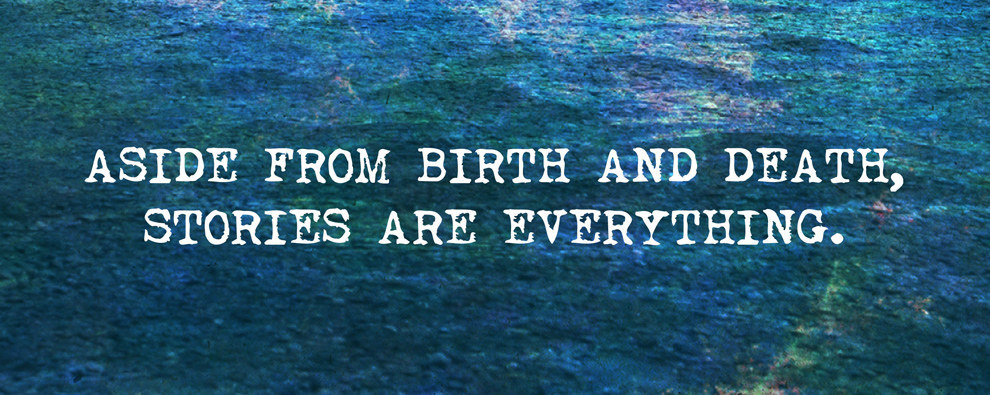
Henry and Lucinda were different from my other friends. I tried combining them all, but it was an awkward mix. The couple didn't ski; they weren't into Wilco; they didn't travel in a herd of kids in REI gear. They rarely went out, and when they did come to parties, they hovered together in the corner like ghosts. Still, it was this very air of separation that I liked about them. I found them glamorous.
Yet it turned out I didn't really know anything about Henry. I fantasized that my musical friend and his peep-show wife would live in an artists' loft South of Market. When I stopped by one day on an errand, I found Henry's apartment to be a tiny, filthy studio in the Tenderloin.
I'd told Henry I was stopping by that day, but apparently he forgot. He opened the door in his pajamas, frowning.
"Hi," he said. The place was dark and cold. A cat glared at me from the bed.
"Hi."
"You never called her."
"What?"
"About the story. Lucinda."
"Oh. I'm sorry." I gave him the money for the dime bag. (My errand.) "I totally will."
It took a while to do it. I went skiing; I went clubbing with the other copywriters. My boyfriend was a Republican, resulting, somehow, in my taking a class on making soufflés. Finally, out of boredom more than guilt, I called Lucinda. She was sweet on the phone, her voice child-like. She could have been eight years old.
Lucinda was late to our arranged meeting spot at Café Vesuvio, next door to her club. She was breathless and ruddy, much prettier in the afternoon light than the other night I'd met her. We had some drinks and, while being recorded on a small recorder I still have in an old box in my mother's house, where I moved some years later after what some called a breakdown, Lucinda told me she'd always wanted to be a dancer. When she and Henry had gone to Las Vegas, he'd taken her to see some showgirls.
"I wasn't interested in dancing, though," she said.
"Just being looked at?"
"Adored," she said.
After a while she took me to the club. We sat in the dressing room and smoked and talked with the other girls. They gossiped and preened in the mirror in silky robes. I studiously took notes in my sketchbook. Shift change. Robes. Many are art school students. Shoes. Lucinda rose and got some white go-go boots from the prop box. She undressed without speaking and put on high heels, then leaned into the mirror and painted her smooth lips geisha red.
"Come on," she said, turning to me. "Put on the boots."
Her indifference. There was no discussion, no tiresome should I? I zipped them up, then followed her gleaming shoulders into the hallway. We put out our cigarettes and ducked through the door to the stage. The other girls were already dancing. They waved to us.
I never went past the curtain, and instead just stood there, peeking in. It was cold, and the air smelled like bleach. None of this mattered, though, in the presence of Lucinda. She twirled, she glided, she prowled. The other girls tried, but they were nothing but paper dolls around her. Lucinda's leg went up to her ear, then past it to some other dimension. Though the one-way glass, I could see the shadows of heads bobbing next to her window.
Eventually—ten minutes? Twenty?—she floated over. "They don't keep it warm enough in here," she said. We shared a cigarette, and then she went out to dance again. I thought about how I would never tell my boyfriend about this, and then of Henry, where he might be. Was he at home, stoned with his cat, reading Murakami? Was he looking at the door, waiting for his shimmering wife to return?
After a few more numbers we went back, dressed together, and then ran out laughing onto the sidewalk. My throat was clogged from the cigarette smoke. Lucinda opened her jacket and pulled out the white boots. The sequined purse slid down her shoulder as she held them up.
"I stole these for you," she said in that voice of hers.
It was one of those rare, pure moments. You know what I'm talking about, don't you, Sylvia? A tiny pause in life you know is both nothing yet everything at the same time. I thought of Henry at the office at six in the morning, sitting in the dark to earn a few free hours with his wife. It made sense now, all of it, the same way it did when you met Ted.
Lucinda. It was impossible not to be in love with her.

We know your story, Sylvia. We know the arc. The unearthly passion, the madness, the downward spiral. So we know where this is going, don't we? After all, I've said that you remind me of my friend Henry. The way you gave yourself over to another person, let him inhabit you, the way you molded your life for him. Some feminists go wild over what you did for Ted. They say you're a horrible example, a terrible mother. I'm a feminist and a mother, but I know madness and love. Those words you left us in spite of it all, they clean the slate in my opinion. Maybe I'm just more forgiving as time goes on because of my own mistakes. Still, I think you did okay.
Henry's collapse started with a literal one across the coast on September 11, 2001. It took about a month for the full impact of this to hit the agency. Yoga class was cancelled. There was a meeting during which "family" was no longer mentioned. There would be consultants coming in, judging our productivity.
Very bad things began happening, Sylvia. The female half of the leather pant couple left to live with an investment banker. The male counterpart, abandoned and angry, sexually harassed a producer until he was fired by the board. Our receptionist shot himself. The company mascot got dog cancer and died. One day in late November, my computer was locked and my belongings were waiting in a cardboard box. Henry, who must have been the first one to receive the news when he came in at his customary early hour, was already gone.
It was a fairly instant blight. No jobs anywhere. I signed up for unemployment, then wrote about five hundred words on my afternoon with Lucinda and sent them to Henry. He never mentioned them, which I took to mean (correctly) that they were not very good. People were draining out of the city; my boyfriend left, as did most of my friends. They were going back East to work for their families or go to school.
Lucinda and Henry wouldn't leave. What set them apart from the rest of my friends, of course, was not their glamour. It was that they hadn't come from families with money, meaning there was no safety net when things hit bottom. But Lucinda still had her job, so they seemed all right. We went to dinner from time to time in the cheap Vietnamese places in their neighborhood. Henry and I talked about books, and Lucinda picked at her food. But something was happening. Henry was thinner and angry.
One night we met for a drink without her. He had a big blue smudge beneath each eye. Lucinda had moved from peep shows to a hardcore club, he said. She gave lap dances now, and other things she wouldn't talk about. He couldn't ask her to stop, as it was what she wanted. He was living on the money his wife made pleasing other men.
I believe I ended up leaving the city without seeing Henry again. I know that seems abrupt, given the cadence of the story so far. The fact is I can't quite remember this part. It was a time filled with fear, and no one had any plans. It wasn't unusual at the time to leave without announcement. So many people were fleeing that the goodbye gatherings had become a joke. Perhaps I went by, perhaps I didn't. It's been a long time.
What I do know is I called and left a message. I also know that about a month later, he left one for me. Sylvia, I remember every word.
He said he was desperate. That he had no money. That Lucinda was thinking of leaving him. That he was working at a grocery store.
"Did I know anyone?" he asked the machine. "Anyone at all that could help?"
I didn't. That's the truth. I didn't know anyone who needed drugs, or a computer coder, or a lap dance. But he was my friend, and for the last three years I had been able to make him laugh for no reason. So yes, I did know someone who could help. Me.
But here's the thing. Can there be a thing, Sylvia? There can, and there was: my father. When I was growing up, Dad would sometimes take me to our sun porch to talk to me. It was a nice house, Sylvia, a lot like the house in Winthrop where you spent your early childhood. The room was warm and yellow. We'd balance a chipped plate laid with salty crackers with soft cheese on a cushion between us. My father would tell me about how some people survive hardship, while others, inevitably, don't. How in those situations, no matter how much I like those people, it is important to create distance. How a drowning man will pull you down with him, even if he doesn't want to. It's instinct, my father, sipping something on ice out of a mug.
When I was young I worshipped this man, damaged as he was. Much as you worshipped Otto. Do you remember how you never got over his death? How Ariel sprung from the loss?
You stand at the blackboard, daddy
In the picture I have of you
A cleft on your chin instead of your foot
But no less a devil, no not
Any less the clack man who
Bit my pretty heart in two.
Sylvia, Henry called because he needed me. I almost responded. But then I thought of my father, and what he said to me. Even though I knew he was a drunken phony. Hell, I still believe the things he used to tell me. There was no way I could help Henry, I reasoned. He had Lucinda, and getting involved would only be confusing.
Now you see the real thing, don't you? What this musing really is. A cheap ploy by a writer looking for forgiveness. From you, from me, from Henry. Someone. Because I was wrong, and so was my father. Henry was my friend, and I should have called back.

Last night, I was lying in bed with my daughter. She's three. I don't think as much about motherhood as you did, Sylvia. Those aren't my favorites, those mother poems. I'm less of a thinker, more of a doer. To me, it's no miracle. Just simple life. I had a child, and we love each other. We muddle through.
But last night she looked at me. She said, "You, me, and Dada, we're never going to die, right? Daisy"—our rasping dog—"might die, but we won't, right?"
I wasn't quite ready to go into the nature of death. It was late. Maybe I was lazy. So I did something you wouldn't. I lied.
"Right," I said. "We won't die. You'll be okay. Have some water."
We fuck people up, Sylvia. Our kids, our friends. Even if we don't stick our head in the oven while they're in the next room.
When I returned to San Francisco, it was a different place, more reasonable. People had jobs with regular-sounding titles again. The companies with the foot warmers and yoga, the ones I now know are especially dangerous, were mostly corralled in down Silicon Valley by then. I hadn't ever called Henry and Lucinda, and they hadn't called me. Still, I thought about them sometimes, extracted relics from my life, like butterflies hovering together on the tip of a pin.
Then, on one of those wastefully bright California afternoons, I happened to pass by the peep show. I went in to the club and asked for Lucinda by her stage name, the man at the counter told me she'd left. I went home and I tried calling. Their numbers had changed and their emails weren't working.
A few weeks later I ran into the culture curator from our old agency. We went for a drink. She was even more beautiful and nervous, and still alone. We caught up a bit, talking about the people we used to work with.
"I've got to call Henry," I said. "It's been years. I've really got to call that guy."
The curator smiled. It was the sort of smile that rises inappropriately, when one has to say something really bad.
"Oh, Henry died. Didn't you know?"
No. I didn't know.
"Oh, yes," she said. Lucinda had broken up with him. Henry ran out of money. Then, having gotten in over his head with drugs and depression, he rented a car, drove to Land's End, rolled up the windows and lit a charcoal grill in the passenger's seat.
"Apparently," the curator said, "this is a very popular way to die in Japan."
This is another place that gets a little vague. I believe I started crying. I remember the curator was sympathetic and uncomfortable. After a while, she left. And then I stopped sleeping.
For I while, I became obsessed with the details of it. What was the date? The spot? Where was the car? I looked for Lucinda. I went to the clubs, searched her name on the fledgling internet. I called the curator again, as she told me she'd heard Lucinda had gone to beauty school.
"Where?" I asked. "Here?"
She didn't know, she said a tiny bit impatiently. She was sorry. It was so sad, the whole thing.
"I went to the club with her once," I said.
The curator laughed politely.
"Nothing but white boots," I said. I tried to explain the story, but she didn't understand.
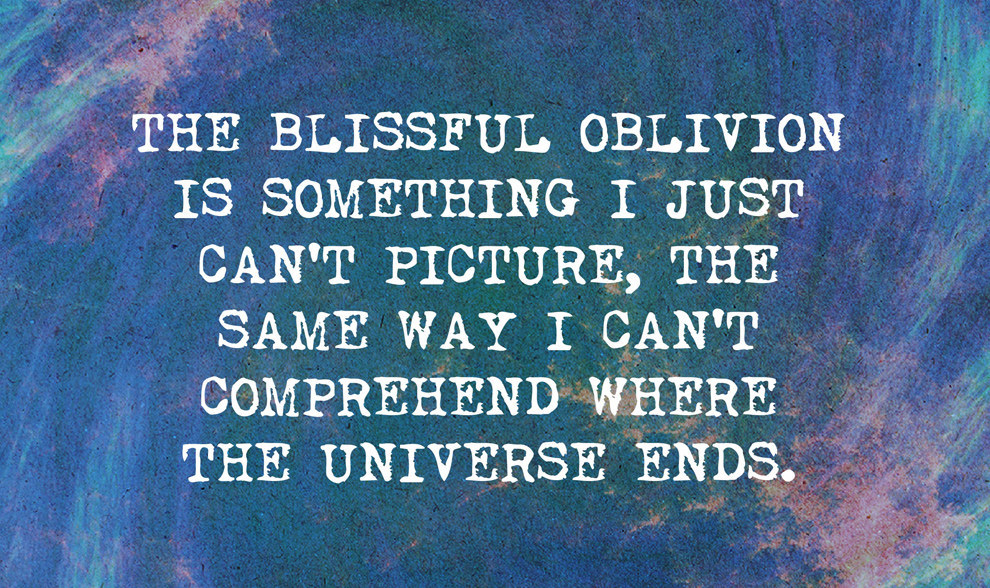
I blissfully succumbed to the whirling blackness that I honestly believed was eternal oblivion.
That's what you wrote of your first attempt at suicide, Sylvia. I mean that time you took those pills and holed up in a crawl space under your mother's house. I imagine that's what Henry did too, as the carbon monoxide robbed his brain of oxygen. The whirling blackness. Actually, it sounds kind of nice.
But I'm afraid, Sylvia. As you can tell by now, I'm sort of a scared person. And what I'm really scared of is that the succumbing wasn't blissful at all. I'm afraid that you both choked and suffocated, or that blood came out of your nose as your brain exploded, or, worst of all, that you realized too late you didn't want to do this.
Though maybe it's my problem. I have this fundamental mental roadblock, see, that there's no way lack of life could be better than living. The blissful oblivion is something I just can't picture, Sylvia, the same way I can't comprehend where the universe ends. It becomes this Escher puzzle: I want Henry to have had a good ending; I know he didn't have a good ending; I'm back at the beginning wondering how he ended. There's the guilt, of course, because maybe I could have done something. But also, my chemical makeup can't believe that the blissful oblivion could be better than laughing in the bathroom with me.
You wouldn't have liked me, probably, Sylvia, I tend to see things very simply. Remember? The eggs. Henry couldn't do that, see things simply. And I think, given your blessed pages, you couldn't either.
The main difference between me and Henry and you, I've figured out after all of these years, is that I don't live quite as largely as the two of you did. I don't feel as much, and that makes life survivable. When I'm wandering around in the night, I don't go all the way to the edge. I can make it all blank and just wish for things.
So here's what I wish for you, poet genius. Here's what I wish for Henry, the friend I didn't save. I wish that you were correct about the whirling blackness. That the oblivion was, in fact blissful. And that, in the dark space, your dried-up heart—withered from overuse—finally found the blood you were looking for. So that as the air seeped out of your lungs, the rest of your body was able, finally, to bloom, to burst, to blaze.
***
Katie Crouch is a New York Times best-selling novelist and essayist. Her books include Girls in Trucks, Men and Dogs, and Abroad. She has also written two novels for young adults, and has contributed to The London Guardian, The San Francisco Chronicle, McSweeney's, Tin House, Slate, Salon, and Glamour. A MacDowell Fellow and alumnae of Brown University and the Columbia MFA program, Katie lives with her family in Bolinas, California.
To learn more about ZYZZYVA, click here.
To learn more about Abroad, click here.
